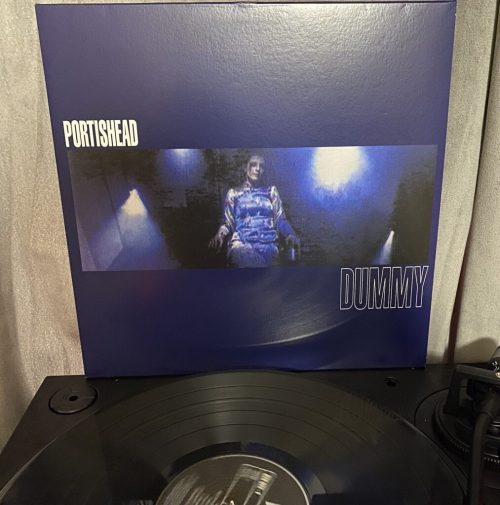In August of 1994, a band called Portishead introduced the world to the “Bristol Sound,” a style of music kickstarted by fellow Bristolians Tricky and Massive Attack, which would become widely known as “trip-hop.” The music is an amalgamation of hip-hop beats, jazz, funk, and movie soundtracks, with slow tempos and a moody lyricism. Portishead’s sound would become the template for many artists to follow, such as Goldfrapp, The Sneaker Pimps, Hooverphonic, and Morcheeba.
Founded by singer Beth Gibbons and producer Geoff Barrow, the duo quickly joined forces with co-producer/guitarist Adrian Utley and solidified the band. Utley would formally join the album as the third member after the album’s release. First creating a short film called To Kill A Dead Man, which earned the band a record contract, the band’s debut album elaborated on the musical themes of that project.
Dummy (Go! Discs/London, 1994) used samples from other records, but the band would also create their own sounds which were pressed to vinyl, a technique they would utilize almost exclusively on their self-titled follow-up album. The vinyl records were placed on the floor of the studio and walked on to create surface noise.
Opening with the somber, theremin-heavy “Mysterons,” the song introduces what’s to come: spy movie soundscapes, turntablism, and of course, Beth Gibbons’s aching vocals.
The album’s most well-known track, “Sour Times” follows. Featured as the closing theme of To Kill a Dead Man, the song is built on a manipulated sample of Lalo Schifrin‘s “Danube Incident,” and features the infectious refrain “cuz nobody loves me it’s true not like you do.”
Other stand-out tracks include “It Could Be Sweet,” the first song recorded by Gibbons and Barrow as Portishead; the first single “Numb;” ”Roads,” named for the Rhodes piano that underpins the track; and “Biscuit,” a melancholy, disorienting song featuring a pitched-down sample of Johnnie Ray’s “I’ll Never Fall in Love Again.”
The album’s closer “Glory Box” is a cinematic opus, built on an Isaac Hayes sample, and features a pained guitar solo by Utley.
Portishead followed up with their second album, Portishead (Go! Discs/London, 1997) which followed a similar template from their debut, but with the band largely creating their own samples, as well as a live album, Roseland NYC Live (Go! Discs/London, 1998) Their most recent album is the appropriately named, Third (Island/Mercury, 2008), an album which eschewed trip-hop entirely, instead utilizing various analog synthesizers, for a 60s psychedelic and krautrock-inspired sound.
While Portishead has not released any new music in years, the band members have stayed busy: Gibbons has gone on to a solo career, Barrow performs with the band Beak>, and Utley continues to do session work and produce.
It cannot be overstated the importance and influence of Portishead on the music that came after. Apart from the obvious crop of trip-hop bands that formed in their wake, modern genres such as SoundCloud rap, chillwave, and vaporwave owe a debt of gratitude to Portishead’s dreamy soundscapes and chill vibes. Artists from Radiohead to Björk to Lana Del Rey show influence from Portishead’s style, while The Weeknd & Ye have been accused of using uncleared samples from the band.
